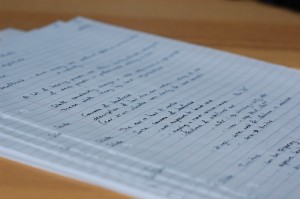(Please read this if you are making a booking for the first time)
Manual Note-takers provide a communication service in the form of a hand written set of notes in English.

Qualified Manual Note-takers are trained to provide an accurate summary but not a word-for-word record. The notes are written in longhand and are normally given to the client at the end of the assignment; or they can be taken away and typed up later (an extra charge could apply for this service).
Note-takers work in virtually any situation where a client may need notes but cannot, for any reason, write their own. This could include D/deaf, deafened, hard of hearing people or deafblind people, those with dyslexia, visual or mobility impairments or those who are prevented by other reasons from taking notes themselves.
Note-takers regularly work in environments including academic, professional and commercial settings, employment/redundancy interviews, training courses, medical appointments, social work, voluntary organisations, deaf organisations, youth clubs, workshops and so on.
The Note-taker needs to sit where they can see and hear the presentation clearly – this may or may not be next to client; this is the client’s decision. The work is demanding both physically and mentally and Note-takers will require regular breaks. Please do not expect Note-takers to work through any breaks. Depending on the type of assignment or if the booking is for more than 3 hours the Note-taker may request that a co-worker is booked. This will be discussed at the time of booking.
It is a good idea to book in advance whenever possible as there are not many qualified and registered note-takers available.
You will not be expected to provide any specialist equipment other than a suitable table and chair.
It is most helpful if copies of any briefing information, agenda, minutes, notes, presentations, handouts, scripts and so on are provided in advance of the event or in printed form at the beginning – the Note-taker cannot copy down what is on slides and so on and write down what is being said at the same time. Without these printed copies a full set of notes cannot be supplied to the client.
Any videos/DVDs etc. should have either subtitles or a full transcript (for D/deaf, deafened or hard of hearing clients). A transcription service can be provided but as this is a lengthy process requests need to be made well in advance of the assignment date if at all possible (an extra charge could apply for this service).
A briefing 10 minutes before the event begins is helpful to ensure people are aware of the role of the Note-taker. A copy of these notes can be downloaded here and could be distributed beforehand – to lecturer, trainer, event leader and so on.
Qualified and registered Note-takers are bound by Codes of Practice and Ethics. They will be impartial and will maintain confidentiality. They will remain unobtrusive and will not take part in the session.
You can download Codes of Practice and Ethics here:
The Association of Notetaking Professionals
The Nationals Registers of Communication Professionals working with Deaf and Deafblind People
Finally – payment of fees can often be funded by the Access to Work Scheme details of which can be found here.
Colleges should provide support for students.
Students in University may be funded via the Disabled Students Allowance (DSA) details of which can be found here.
